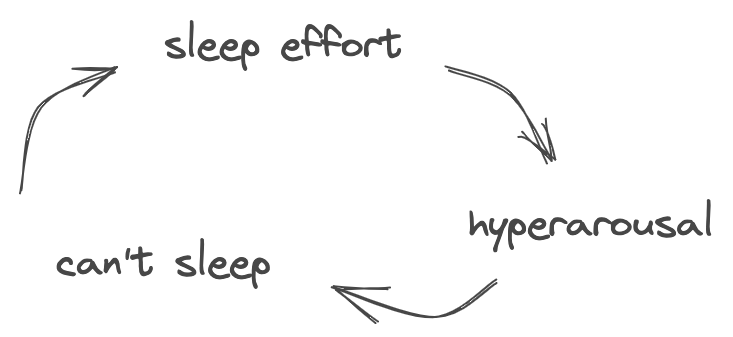You Are Getting Terrible Sleep Advice

I’m a sleep therapist and I think most advice on how to fix your sleep is terrible.
You know the drill. You’re lying in bed, tossing and turning, desperate for sleep. You’ve tried every trick in the book: meditation, supplements, blue light blocking glasses, white noise, ASMR, essential oils – the list goes on. But what if I told you that trying so hard might actually be making your sleep problems worse?
When it comes to sleep, everyone has their own ideas on what works, and there is no shortage of expert advice on the internet.
One curious thing I’ve noticed is that folks who are most eager to give advice are often the ones struggling with sleep the most. On the flip side, if you ask those who sleep like logs for their secrets, they usually don’t have much to offer. Most often you will hear that they just lay down and drift off. No fancy hacks, techniques, or tricks. In fact, good sleepers hardly give sleep a second thought.
In this article, I want to show how heeding (terrible) advice that leads to exerting effort can actually exacerbate your sleep problems.
But first, let’s start by clearing up some misconceptions about insomnia.
What is Insomnia, Really?
When most people think about someone with insomnia, they picture a severely sleep-deprived individual barely making it through the day after not sleeping at all.
The truth is that sleep deprivation and insomnia are two different things, and it’s crucial to distinguish between them. Sleep deprivation occurs when you don’t get enough sleep because the opportunity to rest simply isn’t there – either by choice or due to external factors like a new baby, night shifts, or illness.
Insomnia, on the other hand, is difficulty falling asleep or staying asleep despite having ample opportunity. In fact, insomniacs often go out of their way to create the perfect conditions for sleep, investing in the latest sleeping gear and following every sleep hygiene rule in the book. Yet, sleep remains elusive.
It’s the frustration and debilitating nature of putting in all that effort and still struggling to sleep that holds the key to understanding how to fix insomnia.
The Problem With Trying to Sleep
Good sleepers don’t put in any effort to fall asleep. Insomniacs, however, do, and that’s the problem.
Your subconscious, fear-driven mind picks up on your behavior. When it sees you stressing and worrying about sleep, trying to constantly fix it, your brain’s fear center gets triggered. The brain starts to view sleep as a goal that requires extraordinary measures to achieve. Sleep becomes dependent on your nightly performance – if you mess up, you’ll pay the price the following morning.
Instead of relaxing, your brain thinks it needs to work and perform. This sends your body into a state of hyperarousal, characterized by heightened vigilance and, in many ways, the exact opposite of sleep. Over time, this may even create performance anxiety when you attempt to sleep, as you fret about the harm that lack of sleep may cause, pushing you to try even harder.
The notion that trying too hard is the cause of insomnia might sound like an oversimplification, but this principle is well-understood in the behavioral sleep medicine community. The vicious cycle of insomnia happens because you’re attempting to control something that isn’t directly controllable.
By treating sleep as a problem that needs fixing by putting in more effort, you teach your brain that being awake when you can’t sleep is bad, creating a vicious cycle that makes falling asleep even harder.

The Minimalist Approach to Fixing Sleep Problems
Sleep comes when you’ve been awake long enough. Just like hunger or thirst, your sleep drive increases the longer you go without it. This buildup of sleepiness, known as your homeostatic sleep drive, means you don’t need to do anything special to fall asleep – just stay awake.
To get back on track, stop trying to control your sleep and trust your natural sleep drive. I know it’s easier said than done, but your brain is a creature of habit. It learns from your actions, not your thoughts or feelings. So, if you act like sleep (or the lack thereof) isn’t a big deal, your brain will eventually get the message and stop stressing about it.
Remember, your brain takes cues from your behavior. If you treat sleep like a problem that needs solving, your brain will work overtime to help you “fix” it when it should be relaxing and letting your natural sleep drive take the wheel.
Keep It Simple
Most advice on how to fix your sleep isn’t going to work, because it’s part of the problem. Trying one thing after another that only serves as a catalyst to insomnia by teaching your brain that sleep is about performance. That you’ll only achieve sleep if you get all the conditions for sleep just right.
The truth is that sleep is something that body can handle on its own if you let it. All you need to do is to stay awake and the body takes care of the rest. Here’s two simple principles that will help you stay out of the way.
-
Stick to a consistent wake-up time, even on weekends. This simple yet powerful habit is going to give you the most bang for your buck when it comes to sleep. Waking up at the same time every morning no matter how well you slept the night before is going to help you build a strong sleep drive for the following night and at the same time align you circadian rhythm by exposing you to light early in the day. If you are going to one thing to fix your sleep, this is it.
-
Go to bed when you are sleepy. Adopt a flexible bedtime and let your body decide when it’s ready. Only hit the hay when you’re genuinely sleepy, and if you still can’t sleep, don’t be afraid to get up and do something enjoyable until you feel drowsy again. When you act like not sleeping isn’t a big deal, your fear-driven brain will catch on and stop treating sleep as a performance act.
By focusing on these two simple principles, you can help retrain your brain to stop worrying about sleep and start embracing the natural sleep drive that’s been there all along. So, give yourself a break, stop trying so hard, and you might just find the body can handle sleep fine on its own.